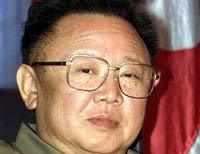Leaders of two Koreas reconsider a peace treaty to replace
South Korea sent special envoys to the United States and other countries Friday to brief them on the accord at this week's summit with North Korea that calls for multinational talks to formally end the Korean War.

South Korean President Roh Moo-hyun and North Korean leader Kim Jong Il agreed Thursday to pursue a peace treaty to replace the current armistice that ended the 1950-53 Korean War, and to seek a meeting of parties to the cease-fire to discuss the matter.
Establishing a peace treaty would require the participation of the U.S. and China, which also fought in the conflict.
"A task before us is the issue of establishing a peace regime on the Korean peninsula, which our people yearn for," Unification Minister Lee Jae-joung told reporters Friday. "In this regard, special government envoys were dispatched to the United States, Japan, China and Russia."
U.S. President George W. Bush told Roh last month that he was willing to formally end the war, but insisted it could only happen after Pyongyang's total nuclear disarmament.
State Department spokesman Sean McCormack stressed Thursday that the peace issue is tied to the nuclear issue.
"I think the South Korean government talked about in the context of arriving at a peace agreement on the Korean peninsula the need to move forward on the six-party talks as a whole," he said of international arms talks aimed at ridding the North of nuclear weapons and programs.
Thursday's agreement cited the nuclear issue in a single sentence, saying the North and South would make "joint efforts to ensure the smooth implementation" of previous accords from the six-nation talks "for the solution of the nuclear issue on the Korean peninsula."
Still, Roh expressed confidence North Korea will disarm.
"Now that the highest leader of North Korea confirmed a clear commitment to the North's nuclear dismantlement, I don't see any problem in carrying it out," Roh said Thursday after returning home from what was only the second summit ever between the two longtime foes.
Pyongyang shut down its sole operating reactor at Yongbyon in July after the U.S. reversed its hard-line policy against the regime, the first concrete progress from years of talks that also have included China, Japan, Russia and South Korea.
Earlier this week, North Korea committed to going further than ever before to scale back its nuclear ambitions by pledging at arms talks with the U.S. and other regional powers to disable its main nuclear facilities and declare all its programs by the end of the year.
Roh also said he briefed the North's leader on Bush's willingness and Kim "expressed specific interest" in a formula that the South and the U.S. discussed about ending the war. Kim "asked the South to make efforts to realize it," Roh said, without revealing its specifics.
"I've returned with the assessment that we can anticipate finally getting out of the half-century shackles of the Cold War and greet an era of genuine peace if the North-U.S. relations improve, along with the resolution of the North Korean nuclear issue, and discussions on a peace regime begin in earnest," Roh said.
In the 54 years after an armistice ended the fratricidal Korean War, two profoundly different Koreas have evolved - a democratic South that is a world economic power buttressed by 28,000 American troops on its soil, and an impoverished, totalitarian North.
To reach a peace treaty, resolving the nuclear issue would be critical. But reunification of the peninsula would still remain a distant goal, unlikely to be achieved unless Kim were willing to release his grip on power.
The two Koreas also agreed on a range of lesser issues: tourist flights from South Korea to North Korea's highest mountain; more trade, more reunions of families divided by the north-south split, even a joint cheerleading squad for next year's Olympic Games.
They also said they would hold "frequent" summits but gave no timeframe, and scheduled meetings between their defense and prime ministers in the coming months.
Subscribe to Pravda.Ru Telegram channel, Facebook, RSS!


